人教新课标必修2 Unit1 Cultural relics Using Language1 课件(18张PPT)
文档属性
| 名称 | 人教新课标必修2 Unit1 Cultural relics Using Language1 课件(18张PPT) | 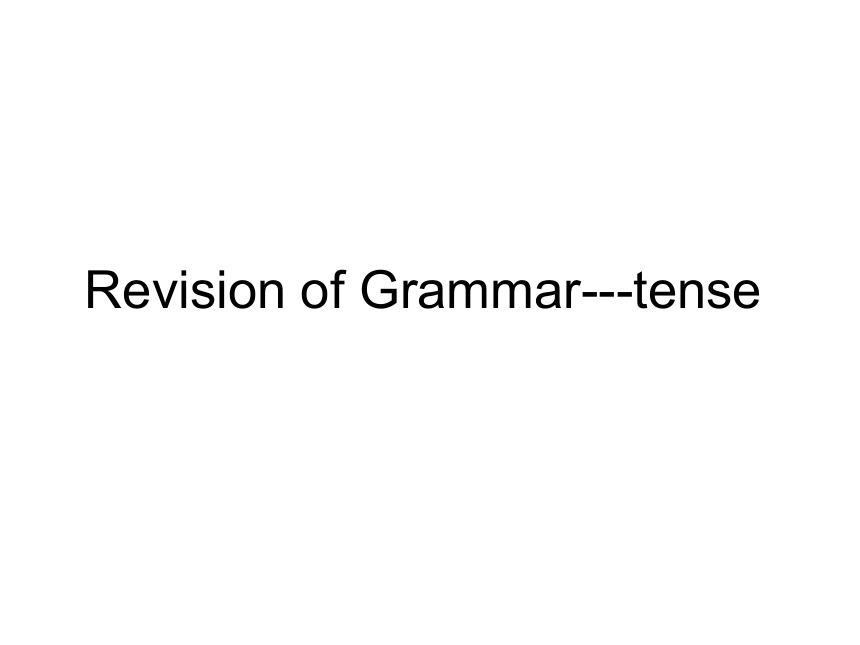 | |
| 格式 | zip | ||
| 文件大小 | 42.8KB | ||
| 资源类型 | 教案 | ||
| 版本资源 | 人教版(新课程标准) | ||
| 科目 | 英语 | ||
| 更新时间 | 2020-02-11 17:30:26 | ||
图片预览

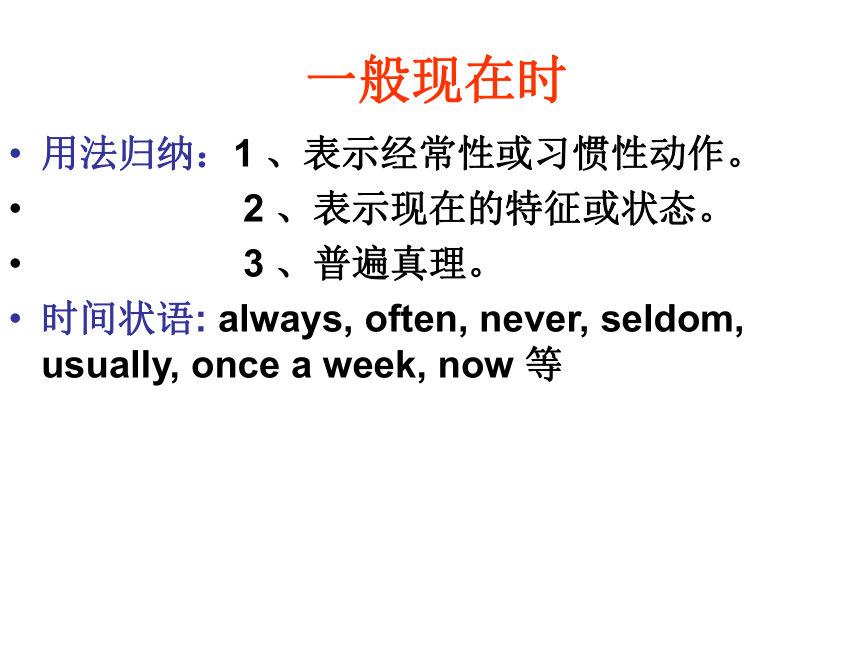

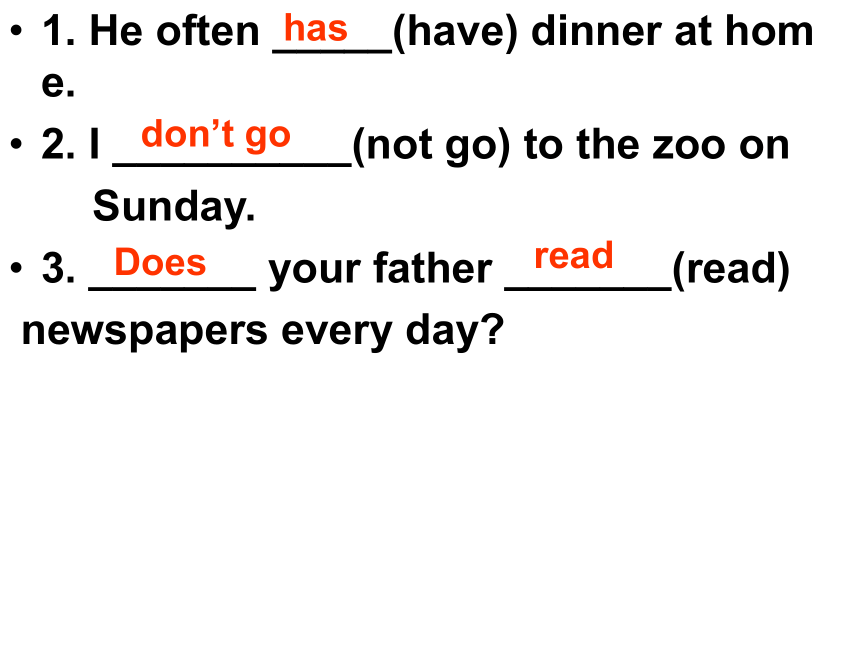
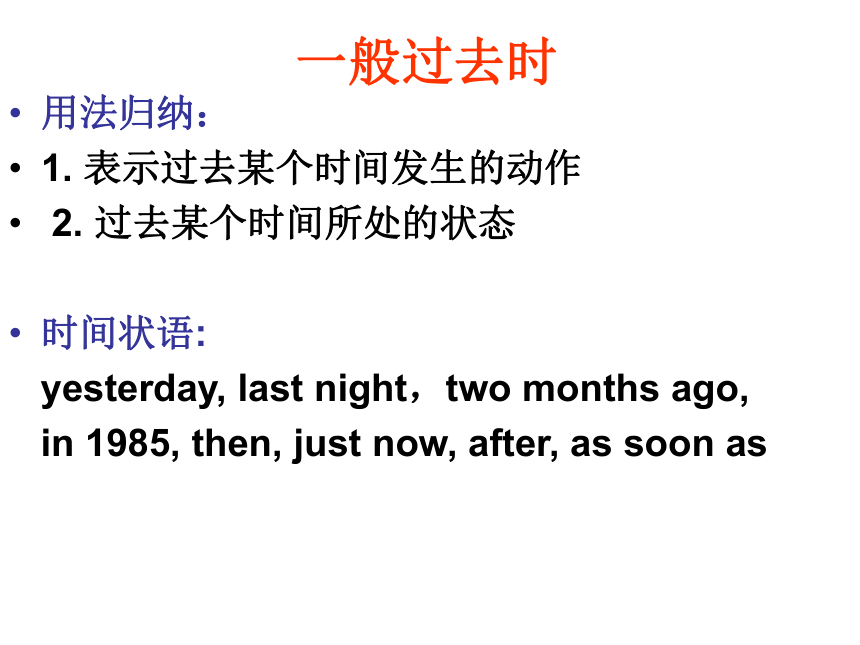
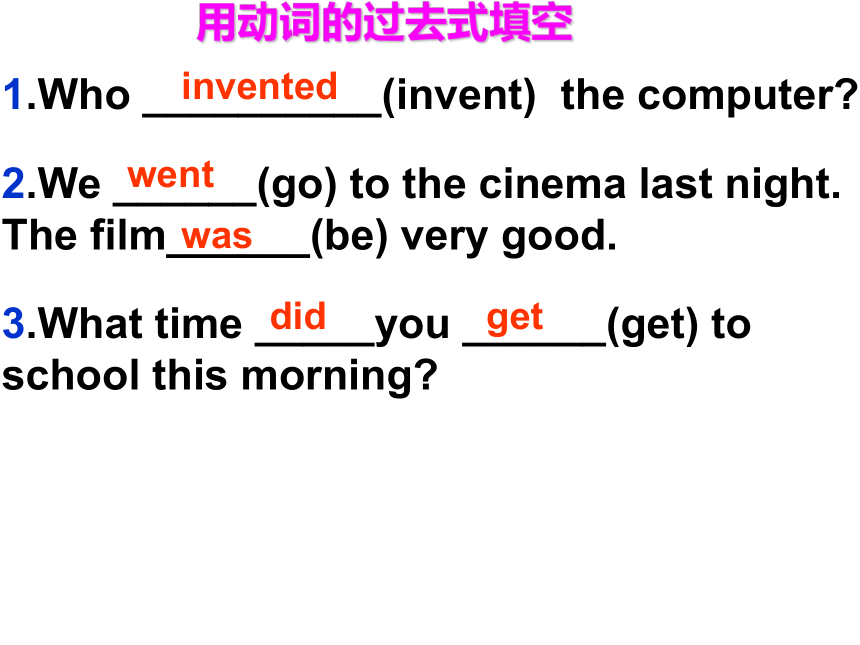
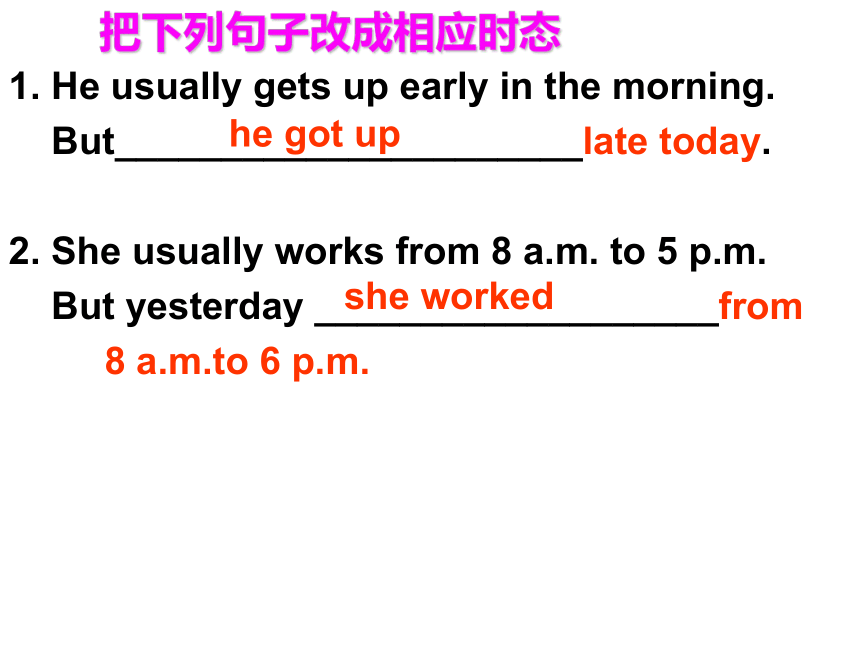
文档简介
课件18张PPT。Revision of Grammar---tense 一般现在时用法归纳:1 、表示经常性或习惯性动作。
2 、表示现在的特征或状态。
3 、普遍真理。
时间状语: always, often, never, seldom, usually, once a week, now 等1. Galileo collected facts that proved the earth _____ around the sun.
A. moved ??? ??B. moves???
C. has moved?? D. had moved
2. According to the time-table, the train for Shanghai _____ at 7 o’clock in the evening.
A. leaves??? B. has left???
C. was left??? D. will leave
时刻表、日程表安排计划要发生的事情用一般现在时表将来。
BA1.?He?often?_____(have)?dinner?at?home.?
2.?I?__________(not?go)?to?the?zoo?on?
Sunday.
3.?_______?your?father?_______(read)
?newspapers?every?day??
hasdon’t goDoesread一般过去时用法归纳:
1. 表示过去某个时间发生的动作
2. 过去某个时间所处的状态
时间状语:
yesterday, last night,two months ago,
in 1985, then, just now, after, as soon as
用动词的过去式填空
1.Who __________(invent) the computer?
2.We ______(go) to the cinema last night. The film______(be) very good.
3.What time _____you ______(get) to school this morning?inventedwentwasdidget1. He usually gets up early in the morning.
But______________________late today.
2. She usually works from 8 a.m. to 5 p.m.
But yesterday ___________________from
8 a.m.to 6 p.m.
把下列句子改成相应时态he got upshe worked现在进行时用法归纳:1、现在正在进行的动作
2、现阶段正在进行的动作
3、经常性动作,含有感彩
时间状语: now, these days, recently, this week 等What are they doing now?
They are playing football.
What were they doing yesterday?
They were playing football.过去进行时用法归纳:
1、过去某一时刻正在进行的动作
2、过去某一阶段正在进行的动作
时间状语: at nine o‘clock, this time last night, those days, at that time,等用进行时态完成句子。
1. Look! What ______they _______ (do) now?
She___always__________(change)her mind. ?
3. Betty __________(leave) for Guangzhou by plane at 3 this afternoon.
4.It ________( rain ) when I went out yesterday.
5. They ______________ (practice ) singing at that time last night.
aredoingischangingis leavingwas rainingwere practicing现在完成时用法归纳:
1、过去开始的某一动作一直持续到现在,以至延伸到将来
2、过去开始的某一动作对现在造成的影响。
时间状语: already, yet, ever, never, by now, so far, recently, by the end of this month, since+时间点, for+时间段 等 过去完成时用法归纳:表示一个动作或状态在过去某一时间或动作之前已经完成或结束
(动作发生在过去的过去)
时间状语:by 1985, by eight o‘clock, by then, by the end of last month, when, as soon as, before 等1.She_____________?(live)?here?ever?
since?she?was?ten.
2.Both?of?them?___________?(be)in?Hongkong?for?ten?days.?
3.?________?you?_____?(find)?your?watch?yet?
4.We?_____________?(paint)?the?house
?before?we?moved?in.?
has lived have beenHavefoundhad painted一般将来时 用法归纳:表示将要发生的动作或情况
时间状语:tonight, tomorrow, the day after tomorrow, next week, in three hours, two days later1.?There ______ a meeting tomorrow afternoon.
A. will be going to?????????????B. will going to be??
C. is going to be???????????????? D. will go to be
2.?He ________ very busy this week, he ______ free next week.
will be; is????????? B. is; is?
C. will be; will be???????????????? D. is; will beCD时态谓语动词的构成时态
一般现在时
一般过去时
现在进行时
过去进行时
现在完成时
过去完成时
一般将来时构成
do/does,(am, is,are)
did,(was/were)
am/is/are+doing
was/were+doing
have/has+done
had+done
will do/ is going to时态综合练习 Since we _____(be)Senior students,we_______ (not go)to the cinema.We must devote all our time to our study.But three weeks ago,a famous film_____(begin)to be shown in our city last night.So,my friend and I _____(decide)to go to see the film. When we ____(get)there,the film__________(start).At last,we didn’t watch the film.When we got outside, it __________(rain).How terrible!
2 、表示现在的特征或状态。
3 、普遍真理。
时间状语: always, often, never, seldom, usually, once a week, now 等1. Galileo collected facts that proved the earth _____ around the sun.
A. moved ??? ??B. moves???
C. has moved?? D. had moved
2. According to the time-table, the train for Shanghai _____ at 7 o’clock in the evening.
A. leaves??? B. has left???
C. was left??? D. will leave
时刻表、日程表安排计划要发生的事情用一般现在时表将来。
BA1.?He?often?_____(have)?dinner?at?home.?
2.?I?__________(not?go)?to?the?zoo?on?
Sunday.
3.?_______?your?father?_______(read)
?newspapers?every?day??
hasdon’t goDoesread一般过去时用法归纳:
1. 表示过去某个时间发生的动作
2. 过去某个时间所处的状态
时间状语:
yesterday, last night,two months ago,
in 1985, then, just now, after, as soon as
用动词的过去式填空
1.Who __________(invent) the computer?
2.We ______(go) to the cinema last night. The film______(be) very good.
3.What time _____you ______(get) to school this morning?inventedwentwasdidget1. He usually gets up early in the morning.
But______________________late today.
2. She usually works from 8 a.m. to 5 p.m.
But yesterday ___________________from
8 a.m.to 6 p.m.
把下列句子改成相应时态he got upshe worked现在进行时用法归纳:1、现在正在进行的动作
2、现阶段正在进行的动作
3、经常性动作,含有感彩
时间状语: now, these days, recently, this week 等What are they doing now?
They are playing football.
What were they doing yesterday?
They were playing football.过去进行时用法归纳:
1、过去某一时刻正在进行的动作
2、过去某一阶段正在进行的动作
时间状语: at nine o‘clock, this time last night, those days, at that time,等用进行时态完成句子。
1. Look! What ______they _______ (do) now?
She___always__________(change)her mind. ?
3. Betty __________(leave) for Guangzhou by plane at 3 this afternoon.
4.It ________( rain ) when I went out yesterday.
5. They ______________ (practice ) singing at that time last night.
aredoingischangingis leavingwas rainingwere practicing现在完成时用法归纳:
1、过去开始的某一动作一直持续到现在,以至延伸到将来
2、过去开始的某一动作对现在造成的影响。
时间状语: already, yet, ever, never, by now, so far, recently, by the end of this month, since+时间点, for+时间段 等 过去完成时用法归纳:表示一个动作或状态在过去某一时间或动作之前已经完成或结束
(动作发生在过去的过去)
时间状语:by 1985, by eight o‘clock, by then, by the end of last month, when, as soon as, before 等1.She_____________?(live)?here?ever?
since?she?was?ten.
2.Both?of?them?___________?(be)in?Hongkong?for?ten?days.?
3.?________?you?_____?(find)?your?watch?yet?
4.We?_____________?(paint)?the?house
?before?we?moved?in.?
has lived have beenHavefoundhad painted一般将来时 用法归纳:表示将要发生的动作或情况
时间状语:tonight, tomorrow, the day after tomorrow, next week, in three hours, two days later1.?There ______ a meeting tomorrow afternoon.
A. will be going to?????????????B. will going to be??
C. is going to be???????????????? D. will go to be
2.?He ________ very busy this week, he ______ free next week.
will be; is????????? B. is; is?
C. will be; will be???????????????? D. is; will beCD时态谓语动词的构成时态
一般现在时
一般过去时
现在进行时
过去进行时
现在完成时
过去完成时
一般将来时构成
do/does,(am, is,are)
did,(was/were)
am/is/are+doing
was/were+doing
have/has+done
had+done
will do/ is going to时态综合练习 Since we _____(be)Senior students,we_______ (not go)to the cinema.We must devote all our time to our study.But three weeks ago,a famous film_____(begin)to be shown in our city last night.So,my friend and I _____(decide)to go to see the film. When we ____(get)there,the film__________(start).At last,we didn’t watch the film.When we got outside, it __________(rain).How terrible!
